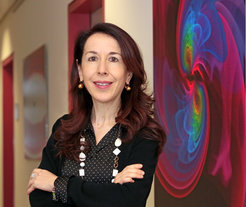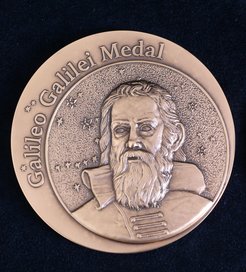Galileo Galilei Medal for Alessandra Buonanno
Award from the INFN and Galileo Galilei Institute to director at Albert Einstein Institute in Potsdam
On the occasion of Galileo Galilei’s birthday, Prof. Buonanno receives the biennial award together with Prof. Thibault Damour (Institut des Hautes Études Scientifiques) and Prof. Frans Pretorius (Princeton University). Since 2019, the Italian National Institute for Nuclear Physics (INFN) in collaboration with its National Center for Advanced Studies, Galileo Galilei Institute (GGI) in Florence, honors scientists who have achieved outstanding results in theoretical physics in the 25 years prior the award date.
The INFN honors Alessandra Buonanno for “the fundamental understanding of sources of gravitational radiation by complementary analytic and numerical techniques, enabling predictions that have been confirmed by gravitational wave observations and are now key tools in this new branch of astronomy”. The award is given principally for advances in the analytic and semi-analytic modeling of black hole mergers, by Buonanno and Damour, and in the numerical modeling of those mergers, by Pretorius. These complementary methods, in combination, provide the theoretical framework for understanding the remarkable results about black hole mergers that have been produced in recent years by the LIGO and Virgo observatories.

“I am very delighted that the INFN recognizes my contributions to gravitational-wave research,” says Alessandra Buonanno, director at the Max Planck Institute for Gravitational Physics (Albert Einstein Institute) in Potsdam and professor at the University of Maryland. “The approach we developed 20 years ago has paved the way to build the highly precise waveform models that today are routinely used by LIGO and Virgo to detect binary systems composed of black holes and neutron stars, and infer unique information about astrophysics, cosmology and gravity.” She adds: “Black holes are no longer black boxes for us, we understand their properties and their fate much better.” Buonanno concludes: “This is an exceptional time for gravitational-wave astronomy and I am thrilled to take part in this adventure with a large group of talented graduate students and postdocs.”
Alessandra Buonanno is the director of the "Astrophysical and Cosmological Relativity" department at the Max Planck Institute for Gravitational Physics in Potsdam. She studied physics in Pisa, and held faculty positions in Paris and at the University of Maryland, where she became full professor in 2010. She is a leading theorist in the field of gravitational-wave physics, and a Principal Investigator of the LIGO Scientific Collaboration. Her work on waveform modeling has been essential in the detection of gravitational waves from binary systems composed of black holes and/or neutron stars, and the physical interpretation of the signals. For her contributions to LIGO and Virgo discoveries, she was awarded several prizes, including the 2018 Leibniz prize – the most prestigious research prize in Germany. She is a Fellow of the International Society on General Relativity and Gravitation, and of the American Physical Society. She holds a professorship at the University of Maryland, and honorary professorships at the Humboldt University in Berlin, and the University of Potsdam.

Since 2019, the Galileo Galilei Medal is assigned every two years by an international selection committee appointed by the INFN to one or at most three scientists. The awardees have achieved outstanding results in theoretical physics, such as fundamental interactions between elementary particles, including gravity and nuclear phenomena, in the 25 years preceding the award date.

